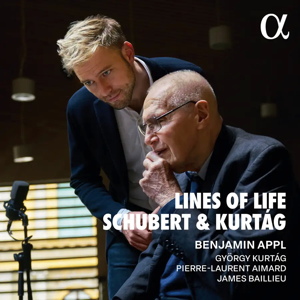
Lines of Life
Benjamin Appl (baritone)
György Kurtág, Pierre-Laurent Aimard, James Baillieu (piano)
rec. 2024, Ferenc Liszt Academy of Music & Budapest Music Centre, Budapest, Hungary
Notes, texts and translations included
Alpha Classics 1145 [68]
“I believe that Benjamin is currently the most authentic interpreter of my Hölderin Gesänge.” So writes György Kurtág in the notes accompanying this disc and, as he is also credited as recording producer, I think we can lay claim to the authenticity of this recording. Kurtág attended all the sessions, which took place in Budapest, apparently producing over 1,300 recording takes and countless repetitions.
The majority of the Kurtág songs on this disc are a capella. Their range, both vocal and emotional, is wide and they are brilliantly performed by Appl, whose variety of expression and ability to meld the wide-ranging melismas in the vocal writing are superb. Indeed the very first song, Circumdederunt, which is in Latin and reminiscent of plainchant, homes in directly on the voice, a peculiarly expressive instrument, capable of harshness when required, as in the words et in trubulatione mea, returning to a beautiful, consoling richness for the remainder of the song. All but one of the Hölderin Gesänge are also unaccompanied and the one that isn’t, unusually has a sort of obligato accompaniment for trombone and tuba. The four Ulrike Schuster songs have an atonal piano accompaniment, which is played here by Pierre-Laurent Aimard.
As an interpreter of contemporary song, then, Appl proves himself to have few equals, but he is also a fine interpreter of Schubert and Brahms, as witness the beautiful versions of the Schubert and Brahms songs included on the disc. As befits a student of Fischer-Dieskau, expression is paramount, but never at the expense of a fine legato line and the beauty of the voce is well caught.
James Baillieu is the fine accompanist for most of the Schubert songs, but in the final two songs, Schubert’s Der Jüngling an der Quelle and Brahms’s Sonntag, Appl is touchingly accompanied by György Kurtág himself, though, it must be admitted, with rather too much pedal.
I found this disc an absorbing and challenging experience and would recommend it to anyone with an adventurous appetite.
The disc finishes with a fascinating eighteen-minute interview in German between Appl and Kurtág, for which an English translation is provided in the accompanying booklet.
Philip Tsaras
Buying this recording via a link below generates revenue for MWI, which helps the site remain free.



Contents
György Kurtág (b.1926)
Circumderunt
Hölderlin- Gesänge, Op.35a
Das Anenehme dies Welt
Nun versteh’ ich
Die Rosen
Die Zeit
Ich weiss nicht
Physalis Alkageng!
Franz Schubert (1797-1828)
Ganymed, D544
Totengrabers Heimweh, D842
Im Frühling, D882
Das sie hier gewesen, D775
Der Wanderer an den Mond, D870
Litanei auf das Fest Allerseelen, D343
Der Jüngling an der Quelle, D300
Johannes Brahms (1833-1897)
Sonntag, Op. 47/3
Interview with György Kurtág by Benjamin Appl

















